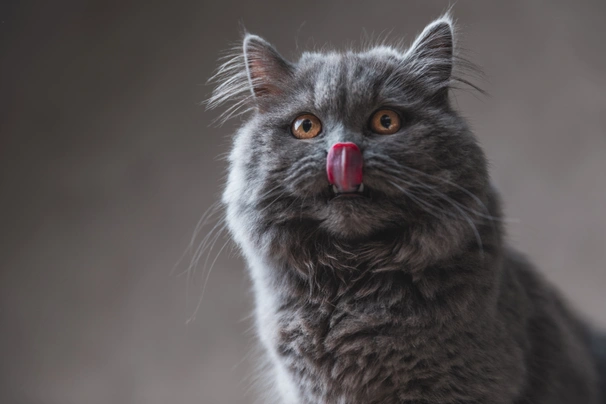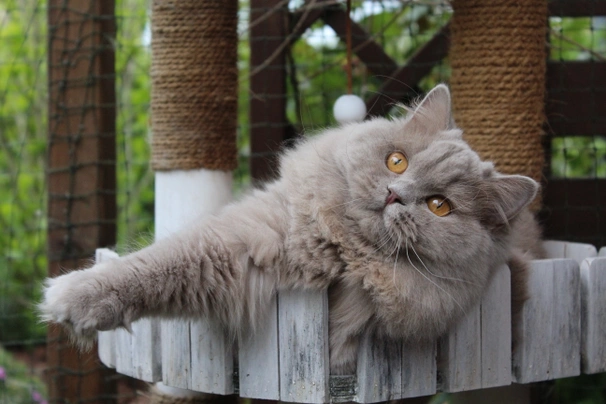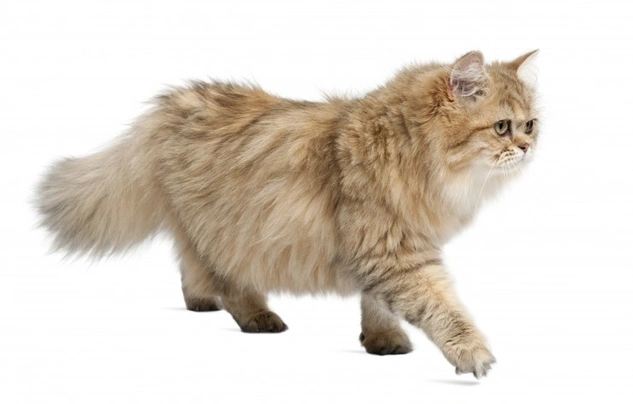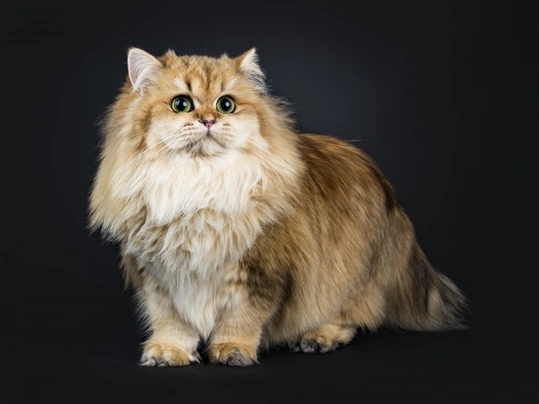British Longhair
Introduction of the British Longhair
The British Longhair is known to be a quiet affectionate and loving cat with an independent side to their natures which in short means they are never overly demanding. Although they have been around for a long time and unlike the British Shorthair the British Longhair is not recognised as a breed by the GCCF although they are recognised by TICA. The only real difference between a British Shorthair and a British Longhair is in the length of their coats.
History of the British Longhair
British Longhairs have been around with records of the breed dating back to the 1870s. The breed is also known as the "Lowlander" in other countries of the world which includes the US and the Netherlands. In Europe these lovely cats are called the "Britanica". Over the years and thanks to their charming and calm quiet natures the British Longhair has found their way into the hearts and homes of many people not only in the UK but elsewhere in the world too. As previously mentioned the British Longhair is recognised as a breed in its own right by TICA but not by the Governing Council of Cat Fanciers (GCCF).
Appearance of the British Longhair
The British Longhair is very similar in looks to the British Shorthair with the obvious difference being in the length of their coats. They are nicely proportioned boasting a kind and honest look which like their British Shorthair counterparts is one of the breed's endearing characteristics. They have round very expressive eyes and powerful compact bodies. Cheeks are full having a nice width between a cat's eyes. Their noses are broad short and straight and when seen from the side cats have nicely rounded foreheads with a slight nose break. Chins are strong deep and firm with cats having level bites.
Ears are small being rounded at the tips and set well apart adding to a cat's endearing looks. The outer edges of a cat's ears are nicely furnished. Eyes are well open round in shape and set well apart without any hint of the Oriental.
The British Longhair has quite a cobby shaped body with short strong backs deep chests and wide across the shoulders and rumps. Legs are short and powerful with cats having round firm paw with close fitting toes having five toes on their front feet but four on their hind feet. Tails are moderately long and thick being that much thicker at the base before tapering to a rounded tip.
When it comes to their coat the British Longhair has a dense straight semi-long and crisp coat with cats having a nice ruff around their necks and breeches. The accepted colours for the breed under the TICA standard are as follows:
- Black
- White
- Red
- Cream
- Blue
- Chocolate
- Lilac
- Tortoiseshell
- Bicolour
- Smoke
- Tipped
- Colour-pointed
- Tabby
Temperament of the British Longhair
The British Longhair is known to be an affectionate and loving cat by nature. They are laid-back with the one problem being they can tend to be a bit lazy. As such these charming cats are prone to putting on too much weight which can negatively impact their overall health and well-being. Never overly demanding the British Longhair enjoys living in a family environment and become totally devoted and loyal to the people they love.
As previously mentioned they are not known to be overly active but are known to have their share of "mad moments" which keeps owners entertained. Being so intelligent the British Longhair likes to mark their territory and therefore they enjoy being able to roam around in the great outdoors although cats should only be allowed to go outside if it is safe for them to do so.
Like other breeds the British Longhair likes a routine and doesn't particularly like it when this changes for any reason. They like to be fed at the same time of the day and don't appreciate it when furniture gets moved around the home which can often stress cats out. With this said being laid back by nature they tend to do things in their own time.
Intelligence / Trainability of the British Longhair
The British Longhair is an intelligent cat but not one that needs to be given a ton of stimulation to keep them happy because they are quite happy to keep themselves occupied until their owners return home. They do adapt well to being kept as indoor cats providing their environment is made as interesting as possible though.
Children and other
British Longhairs with their laid-back placid and affectionate personalities are a good choice for families with children. However care should be taken when very young children are around cats and any interaction should always be well supervised by an adult to make sure things stay nice and calm. With this said children need to be taught how to behave with cats and when it's time to leave them alone.
They also get on well with dogs especially if they have grown up together and the same can be said of other cats they have shared their home with. However they are not so keen on being around cats they don't know. However care should be taken when introducing a British Longhair to dogs they don't already. Care should be taken when they are around smaller pets particularly when they first meet each other.
Health of the British Longhair
The average life expectancy of a British Longhair is between 14 and 20 years when properly cared for and fed an appropriate good quality diet to suit their ages.
The British Longhair is known to be a healthy breed and some cats never develop any sort of disorder. However the two conditions that seem to affect the breed the most are as follows:
- Hypertrophic cardiomyopathy
- Polycystic kidney disease (PKD) - test available
Caring for the British Longhair
As with any other breed the British Longhair needs to be groomed on a regular basis to make sure their coats and skin are kept in top condition. On top of this they need to be fed good quality food that meets all their nutritional needs throughout their lives which is especially true of kittens and older cats.
Grooming of the British Longhair
The British Longhair boasts having a semi-long dense coat and as such they are high maintenance on the grooming front. Their coats need to be brushed several times a week to prevent knots and tangles from forming. Like other breeds they shed steadily throughout the year only more so in the Spring and then again in the Autumn when more frequent brushing is usually necessary to keep on top of things.
It's also important to check a cat's ears on a regular basis and to clean them when necessary. If too much wax builds up it can lead to a painful infection which can be hard to clear up. In short prevention is often easier than cure with ear infections. Cats often suffer from ear mites which is another reason why it's so important to check their ears every week or so.
Exercise of the British Longhair
The British Longhair is a not a high energy cat but as previously mentioned they are known to have their "mad moments" which can be very entertaining. They love to be able to go outside but are very adaptable to being kept as indoor pets providing they have plenty of things for them to do. Cats kept as indoor pets need to be given lots of things to do and places they can snuggle up for a snooze when the mood takes them because if there is one thing cats are really good at doing it's napping during the day.
Feeding of the British Longhair
If you get a British Longhair kitten from a breeder they would give you a feeding schedule and it's important to stick to the same routine feeding the same kitten food to avoid any tummy upsets. You can change a kitten's diet but this needs to be done very gradually always making sure they don't develop any digestive upsets and if they do it's best to put them back on their original diet and to discuss things with the vet before attempting to change it again.
Older cats are not known to be fussy eaters but this does not mean they can be given a lower quality diet. It's best to feed a mature cat several times a day making sure it's good quality food that meets all their nutritional requirements which is especially important as cats get older. It's also essential to keep an eye on a cat's weight because if they start to put on too much it can have a serious impact on their overall health and wellbeing. Like all other breeds the British Longhair needs access to fresh clean water at all times.
British Longhair price
If you are looking to buy a British Longhair you would need to pay anything from £150 to over 300 for a well-bred kitten. The cost of insuring a male 3-year-old British Longhair in northern England would be £12.13 a month for basic cover but for a lifetime policy this would set you back £23.42 a month (quote as of May 2017). When insurance companies calculate a pet's premium they factor in several things which includes where you live in the UK a cat's age and whether they have been neutered or spayed among other things.
When it comes to food costs you need to buy the best quality food whether wet or dry making sure it suits the different stages of a cat’s life. This would set you back between £10 - £15 a month. On top of this you need to factor in veterinary costs if you want to share your home with a British Longhair and this includes their initial vaccinations their annual boosters the cost of neutering or spaying a cat when the time is right and their yearly health checks all of which quickly adds up to over £500 a year.
As a rough guide the average cost to keep and care for a British Longhair would be between £30 to £40 a month depending on the level of insurance cover you opt to buy for your cat but this does not include the initial cost of buying a well-bred kitten.

Cream Colour 😻 Male
£650
British Longhair Silver Shaded
£650



